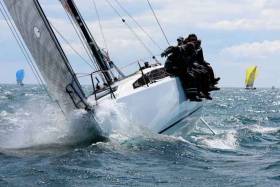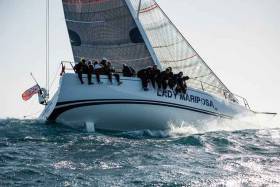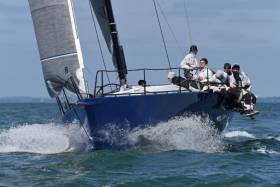Displaying items by tag: De Guingand Bowl
75 Boats for the 2021 RORC De Guingand Bowl Race
The Royal Ocean Racing Club Season’s Points Championship continues with the De Guingand Bowl Race, which will start on Saturday June 26th from the RYS Line, Cowes. The course will be 110-160 nautical miles around marks with a finish in the Solent or adjacent waters. 75 boats have entered the sixth race of the RORC Season’s Points Championship, racing under IRC and Class40 Rules.
Favourites for Line Honours include David Collins Botin IRC 52 Tala, VME Racing’s CM60 Venomous, skippered by James Gair, and Ed Fishwick’s GP42 Redshift. Class40s in action include Marc Lepesqueux’s Sensation, sailed by Eric Bredeka with and all French team and Greg Leonard’s all-American Kite, which will be crewed by the Leonard family.
 Ed Fishwick’s GP42 Redshift © Rick Tomlinson/RORC
Ed Fishwick’s GP42 Redshift © Rick Tomlinson/RORC
IRC ONE
Redshift is the scratch boat in a 12-strong class. Mark Emerson’s A13 Phosphorus II will be defending their class win in 2019. Proven race winners in IRC One include: Andrew Hall’s Lombard 46 Pata Negra, Rob Bottomley’s Mat 12 Sailplane, and David Cummins’ Ker 39 Rumbleflurg as well as Michael O’Donnell’s J/121 Darkwood which leads IRC One for the 2021 RORC Season’s Points Championship.
 Mark Emerson’s A13 Phosphorus II © Paul Wyeth/RORC
Mark Emerson’s A13 Phosphorus II © Paul Wyeth/RORC
 Ross Applebey’s Oyster 48 Scarlet Oyster © Paul Wyeth/RORC
Ross Applebey’s Oyster 48 Scarlet Oyster © Paul Wyeth/RORC
IRC TWO
14 are entered, including a number of teams from yacht charter companies. Ross Applebey’s Oyster 48 Scarlet Oyster, overall winner of the De Guingand Bowl Race in 2019, will be racing. Six Beneteau First 40s will be in action including Ronan Banim’s Galahad Of Cowes, Capstan Sailing’s Skylander and three entries from Hamble based race training school, Sailing Logic: Lancelot II, Merlin and Arthur. Thomas Kneen’s JPK 1180 Sunrise is the overall leader for the 2021 RORC Season’s Points Championship and will continue their duel with Ed Bell’s JPK 1180 Dawn Treader.
 Sailing Logic's First 40 Arthur © Paul Wyeth/RORC
Sailing Logic's First 40 Arthur © Paul Wyeth/RORC
IRC THREE
23 teams are expected to be racing in IRC Three, including many teams racing Two-Handed. Fully crewed entries include Trevor Middleton’s Sun Fast 3600 Black Sheep, skippered by Jake Carter. Six J/109s will be racing fully crewed, including the current leading J/109 for the season, Kevin Armstrong’s Jazzy Jellyfish. Rob Craigie’s Sun Fast 3600 Bellino, racing with Deb Fish, was the class winner for the race in 2019.
 Trevor Middleton’s Sun Fast 3600 Black Sheep © Paul Wyeth/RORC
Trevor Middleton’s Sun Fast 3600 Black Sheep © Paul Wyeth/RORC
 Nigel Goodhew’s Sun Fast 3200 Cora © Rick Tomlinson/RORC
Nigel Goodhew’s Sun Fast 3200 Cora © Rick Tomlinson/RORC
IRC TWO-HANDED
20 teams are entered racing Two-Handed, the majority racing in IRC Three and Four. The top two teams for the season so far will be in action. James Harayda’s Sun Fast 3300 Gentoo, racing with Dee Caffari, and Rob Craigie’s Bellino. IRC Four season leader, Nigel Goodhew’s Sun Fast 3200 Cora will be racing with Mark Heuchan. Cora won IRC Four for the De Guingand Bowl in 2019. The current runner-up in IRC Four, William McGough & Christian Jeffery, will be racing J/109 Just So. Class winner for the Morgan Cup, Richard Palmer’s JPK 10.10 Jangada, will be in the action racing with Jeremy Waitt.

IRC FOUR CLASSICS
22 teams are entered in IRC Four, including a number of classic yachts: Mike Greville’s Bowman 44 Skadi, Giovanni Mazzocchi’s Swan 44 Ithaka, Stephen Brookson’s Swan 411 Kiswala, Jonathan Rolls’ Swan 38 Xara, and Stuart Greenfield’s S&S 34 Morning After. Three Contessa 32s will have their own private battle. Rob Windsor & Stephen Davies racing Colemere, Roger Shapland & Mark Himsworth racing ATV and Christophe Declercq racing Lecas.
Yachts taking part in the De Guingand Bowl Race will start to gather off Cowes Parade from around 0700 on Saturday 26th June. The full entry list and AIS tracking link can be found at https://yb.tl/dgbr2021 and also via smartphones with the YB App. Results will be available with live updates at www.rorc.org
JPK 10.80 Dream Pearls Takes RORC's De Guingand Bowl
In a weekend that saw the only Irish JPK10.80, Rockabill VI, win the biggest ISORA race for many years, Arnaud Delamare and Eric Mordret's sister ship Dream Pearls has won the Royal Ocean Racing Club's De Guingand Bowl Race. In second place was Noel Racine's JPK 10.10 Foggy Dew and third overall was the British Two Handed team of Ian Hoddle and Ollie Wyatt, racing Sunfast 3600 Game On.
Line Honours for the De Guingand Bowl Race went to Piet Vroon's Dutch Ker 51 Tonnerre de Breskens, 36 minutes ahead of their nearest rival, Daniel Hardy's Ker 46 Lady Mariposa. After IRC time correction Lady Mariposa was the winner the big boat class, IRC Zero.
“A very competitive race for us and we are delighted to win the first race of our campaign for the Rolex Fastnet Race” commented Dream Pearls' Christian Maby. “We were happy with our speed and we made some very good decisions with sail selection, especially using our Code Zero on the leg back to St. Catherine's Point. If there was one part of the race that we made significant gains it was there. When we finished, we could see boats around us in IRC Two, so we knew we had done well, but to win is fantastic for the team, and this will give us good hope for the season.”
IRC Three was the biggest class with 27 yachts competing; Dream Pearls took the class win, as well as the overall with Game On second and Thomas Kneen's JPK 10.80 Sunrise in third.
Ian Hoddle's Game On had a terrific race, winning the 20-strong IRC Two Handed Class and placing third overall. However Game On was pushed all the way. In IRC Two Handed Nigel De Quervain Colley's Fastrak XI was only two minutes behind and Ed Fishwick's Redshift Reloaded less than three minutes, after IRC time correction.
“Having been beaten by Bellino and Redshift in the Cervantes Trophy, we were keen to strike back immediately” commented Ian Hoddle. “We nailed a more aggressive start, which paid off as we were in the leading pack on the kite-leg down to the forts. The intensity of competition in the Two Handed fleet is such that a good start can make all the difference. North Head was the low point of our race; a broken jib shackle delayed our kite hoist and the time to fix it and a foul tide punished us. At this point the competition had all positioned themselves for the maximum tide running out of Portland. We continued across to Swanage to see if the anticipated lift provided gains; and it worked to a tee. We made the East Shingles Buoy without a tack and even got the Code Zero aloft! Both Ollie and I had certainly left nothing on the table and by 2am we were exhausted!! Ollie and I last raced together back in 2011. I have never seen someone with so much energy - he literally never stops working around the boat - like a machine :)”
Congratulations to Angus Bates' J/133 Assarain IV, winner of IRC One, Nick & Suzi Jones' First 44.7 Lisa, winner of IRC Two, and Antoine Magre's Palanad II, winner of the Class40 Division. The next race in the 2017 RORC Season's Points Championship will be the Myth of Malham. Mirroring the start of the Rolex Fastnet course, the 256 nautical mile race around the Eddytstone Lighthouse, will be the first weighted race of the championship, with a points factor of 1.2.
RORC De Guingand Bowl Race Preview
The Royal Ocean Racing Club's offshore racing season continues this weekend with the 4th race of the RORC Season's Points Championship. Over 80 yachts are expected to take part with the vast majority of the crews made up of passionate Corinthian sailors with their own set of goals.
Designed to last 24-36 hours, the De Guingand Bowl Race starts and finishes in the Solent and is a flexi-course allowing the Royal Ocean Racing Club to design a bespoke course.
"Without the constraint of finishing the race in a totally different location, we concentrate on the weather and tidal conditions to decide the course," explains RORC Racing Manager, Nick Elliott. "We try to get all of the fleet to finish the first beat in the same tidal vector, so as to avoid a tidal gate early in the race.”
In IRC Zero, Daniel Hardy's Ker 46 Lady Mariposa is the fastest yacht rated under the IRC rating system. However, several yachts in IRC One could challenge Lady Mariposa for Line Honours including Alan Hannon's RP45 Katsu, Edward Broadway's Ker 40 Hooligan VII, and Tor McLaren's MAT 1180 Gallivanter.
In IRC Two, Richard Neocleous' Ocean 55 Julia returns after its debut in last season's championship. The crew come from Hertfordshire and 18 year old Louie Neocleous will skipper Julia as he did last year.
“2016 was a great opportunity to put the team together and we all learnt a huge amount throughout the season.” commented Louie. “This year we are back to race much more competitively, we have a permanent race crew of 8. The remaining 6 crew are all friends, the boat's mate, Simon Jackson and I have crossed the Atlantic together and built a great relationship for the races. Last year, we were just beginners in terms of racing, our best result was 25th out of 86 boats in the Cervantes Trophy. This year, we hope to achieve better results on a consistent basis.”
In IRC Three, Trevor Sainty and Simon Forbes Jelenko is one of many J/109s that will be racing with the RORC this season. The crew have been together for about ten years and did their first Rolex Fastnet with Jelenko in 2015. The De Guingand Bowl Race is part of the teams programme for another crack at the Rolex Fastnet.
“All amateurs and we are all friends, most of the time.” smiled Trevor. “I am a veterinary surgeon working with horses, Simon works in the City, and the rest of the group are from the South of England and London, working in banking and IT. Our aim is to be top J/109 this season and improve our Fastnet finishing position by winning it of course. This will be my eighth consecutive Fastnet and last! - I said that last time.”
In IRC Four Dave Cooper & Paul England will be racing their Dehler 38 Longue Pierre. This will be their first RORC race this season, as part of their 2017 RORC Season’s Points Championship campaign.
“2017 is the 10th anniversary of us having won the great bowl overall.” commented Dave Cooper. This race will continue our rivalry with the Swan Xara. In 2016, we finished on equal points in JOG and the rivalry continues in both JOG and RORC this year. Longue Pierre is approaching her 30th birthday and has spent all of the last 30 years RORC racing.”
The 2017 De Guingand Bowl Race will start from the Royal Yacht Squadron Line, Cowes on Saturday 13th May
Shakti wins RORC's De Guingand Bowl
The 2016 Royal Ocean Racing Club's De Guingand Bowl Race was held in the Solent and South Coast of England in highly changeable conditions. During the course of the race the wind direction swung to every point on the compass and the wind strength varied from zephyrs to 16 knots. Keeping your head out of the boat for the changes and pre-empting and correctly adapting to them was the key to success. RORC racing manager, Nick Elliott, chose a longer course of 123 nautical miles for the faster yachts and a shorter course of 105 nautical miles for the smaller and slower boats, with the overall result being decided on average speed.
Christoph Avenarius & Gorm Gondesen's German Ker 46, Shakti had a fantastic race, taking Line Honours, Class IRC Zero and the overall win for the best corrected time under IRC for the fleet. It is a great start to the season for Shakti. The key regatta for the German team is the RORC IRC National Championship in late June, where Shakti will be competing with about a dozen Fast 40+. Second overall and winner of IRC Three was Arnaud Delamare & Eric Mordret's JPK 10.80 Dream Pearls. Hugo Tardivel's A31 Columbus Circle was third overall and first in IRC 4. However the results in IRC 4 are subject to a pending protest.
In IRC 1, Nick Jones' British First 44.7 Lisa was the winner. Michel Peretie's French prototype Stamina was second with Seb & Michael Blair's King 40 Cobra third. Nick Jones' First 44.7, Lisa leads the class for the season and is second overall for the Season's Points Championship.
"It was an extremely tiring race, a great win and we had a bit of everything." commented Nick. "We did get becalmed a couple of times between The Solent and Owers Buoy, which was frustrating and there were lots of apparent losses and gains during the race; we all had our moments. The big race for Lisa this season is the Round Ireland and although Lisa's co-skipper, RORC Commodore, Michael Boyd was sailing his new boat for this race, we did have six of the crew on board and it was good to jell together. Lisa is a production boat and cannot point anywhere near as high as the race boats but you can manage that. For example in this race, we could see on the AIS that there were boats stuck with no wind under The Needles, so we put in a half mile tack offshore as we passed St.Catherine's Point, so that we could lay past The Needles. We would have been history if we had got stuck there and by having a better angle, we could also foot-off. Lisa is a heavy boat and in light airs, upwind, we tend to sail five to ten degrees off the wind to keep her going."
In IRC 2, Roderick Stuart & Bill Ram's Corby 37, Aurora was the winner. RORC Admiral, Andrew McIrvine racing First 40, La Réponse was second with the Army Sailing Association's J/111, British Soldier in third. Whilst in IRC 3, Arnaud Delamare & Eric Mordret's class win, racing JPK 10.80 Dream Pearls, was enough to put the French team into the class lead for the season. Thomas Kneen's JPK 10.80 Sunrise was second in IRC 3 for the race and James Chalmers' Weymouth team racing J/35 Bengal Tiger was third.
In IRC 4, RORC committee member, Stuart Greenfield racing Silver Shamrock was second to Hugo Tardivel's A31, Columbus Circle, with Noel Racine's JPK 10.10, Foggy Dew third. Robert Nelson's J/105, Bigfoot was fourth in IRC 4, which was enough to put the Two-handed team in first place overall for the RORC Season's Points Championship.
Stuart Greenfield found Silver Shamrock by chance on a trip to Falmouth Cornwall last year and bought the half tonner on the spot. "Silver Shamrock was built for Harold Cudmore by Killian Bushe in Cork and won the 1976 Half Ton Cup. Harold painted her in the colours of his credit card because that's how he paid the builder. After winning the cup the boat disappeared and I found her by luck in Falmouth and sailed her back to Cowes on my own. Silver Shamrock has been refitted and converted to asymmetric sails. My big race of the season is the SORC Round the Rock race this summer, a single handed race to the Fastnet Rock, so over the winter I refitted her to Category 2 standard and took eight coats of anti-fouling off her hull amongst other things."
It was a fantastic feeling to do so well in the De Guingand Bowl Race, when we were becalmed on the first night and the fleet just left us, we never gave up and just kept the boat moving. After coming around the Nab Tower, we must have put in 25 tacks to keep the boat moving. We stayed up all night and managed to get a zephyr and sailed the boat right in under Culver Down, which kept us going. As dawn was breaking, we went right in at St. Catherine's Point to take advantage of the tide, as it turned. We also got into good pressure and according to the tracker we went from a poor ranking position to second in class in those last few hours - never give up."
The Royal Ocean Club's Season's Points Championship continues on Saturday 28th May, over the May Bank Holiday with the Myth of Malham Race. The 256 nautical mile Cowes - Round Eddystone - Cowes course is weighted 1.2 for the championship and a highly competitive fleet is expected to be racing.


























































